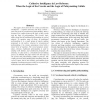Free Online Productivity Tools
i2Speak
i2Symbol
i2OCR
iTex2Img
iWeb2Print
iWeb2Shot
i2Type
iPdf2Split
iPdf2Merge
i2Bopomofo
i2Arabic
i2Style
i2Image
i2PDF
iLatex2Rtf
Sci2ools
HICSS
2016
IEEE
2016
IEEE
Collective Intelligence in Law Reforms: When the Logic of the Crowds and the Logic of Policymaking Collide
This paper shows how the two virtues of collective intelligence – cognitive diversity and large crowds – turn into perils in crowdsourced policymaking. That is because of a conflict between the logic of the crowds and the logic of policymaking. The crowd’s logic differs from that of traditional policymaking in several aspects. To mention some of those: In traditional policymaking it is a small group of experts making proposals to the policy, whereas in crowdsourced policymaking, it is a large, anonymous crowd with a mixed level of expertise. The crowd proposes atomic ideas, whereas traditional policymaking is used to dealing with holistic and synthesized proposals. By drawing on data from a crowdsourced law-making process in Finland, the paper shows how the logics of the crowds and policymaking collide in practice. The conflict prevents policymaking fully benefiting from the crowd’s input, and it also hinders governments from adopting crowdsourcing more widely as a practice fo...
Biometrics | HICSS 2016 |
| Added | 03 Apr 2016 |
| Updated | 03 Apr 2016 |
| Type | Journal |
| Year | 2016 |
| Where | HICSS |
| Authors | Tanja Aitamurto |
Comments (0)

